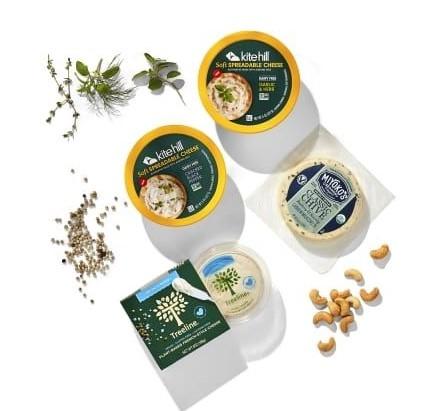Summer charcuterie boards will get an upgraded, plant-based twist with a distinctive assortment of cheese alternatives that are all dairy-free.
By Marian Zboraj|Digital Editor
Source: progressivegrocer.com, May 2021
Nut-based cheese alternatives, banana blossoms and creamy cashew dips top the list
Plant-based foods continue to expand at U.S. grocery as shoppers focus on better-for-you products. According to a recent study of 2,313 U.S. adults age 18 and older by The Hartman Group, nearly half (48%) of respondents look for products labeled “plant-based.” To help shoppers get a leg up on what the biggest plant-based trends will be this summer, Whole Foods Market has revealed its first-ever plant-based trend predictions.
Looking ahead to summer and beyond, the grocer’s Trends Council pooled members’ industry knowledge, product-sourcing expertise, and hands-on work with emerging and existing plant-forward brands to inform the predictions.
“Plant-based is the grocery category to watch right now as brands continue to innovate by using new ingredients and processes that make plant-based products exciting for shoppers,” said Parker Brody, senior global category merchant for plant-based at Whole Foods Market. “And in the laid-back days of summer, we find that customers are breaking out of their routines and are more open to trying something new, whether they’re longtime vegans or just starting to experiment with plant-based eating. So, expect to see gourmet plant-based cheese alternative spreads at picnics and fish alternatives made from banana blossoms on the grill this season.”
Whole Foods Market’s top five plant-based trends for the summer:
1. Alternative Cheeses Go Gourmet. Summer charcuterie boards will get an upgraded, plant-based twist with a distinctive assortment of cheese alternatives that are all dairy-free. While using nut-based milks and ingredients like black garlic truffle, dill Havarti and chive is unique, plant-based cheesemakers are also replicating the methods used to make dairy cheeses for more authentic textures and flavors.
2. BBQ for All (Yes, Even Vegans). Get ready for more plants hitting the grill this summer that go far beyond the veggie burger: Think plant-based products like hot dogs, Italian-style sausages and even jackfruit BBQ. From algae-based casing to hickory smoke concentrate, Whole Foods said that these vegetarian options have unique ingredients making it easy (and flavorful) to incorporate more plants into cookouts to satisfy both meat lovers and vegetarians.

3. Pint-Sized and Plant-Based. For the littlest of eaters, brands are providing plant-forward options that come in kid-approved forms like nuggets and yogurt tubes. There are also ice pops that are superhero-themed, like Chloe’s Plant-Based Kids Pops: Avengers, Spider-Man. Products such as Ripple Kids Non-Dairy Milk, Miyoko’s Creamery Plant Milk Cheddar Sticks and 365 by Whole Foods Market Plant-Based Nuggets can make it easy to sneak healthy plants into kids’ meals, while healthy snacks like Kite Hill Kids Strawberry Banana Almond & Coconut Milk Yogurt Tubes are ideal for busy kids and their on-the-go backyard explorations.
4. Plant-Based Catch of the Day. A new wave of seafood substitutes are on their way. Ingredients like legumes and banana blossoms are being used to mimic the flaky texture of the real thing. This means alternative fish sticks, no-tuna sandwiches and a new depth of flavor in an otherwise simple fish dinner. Back in February, Whole Foods started offering Good Catch plant-based deli-style tuna salad made from a proprietary six-legume blend of peas, chickpeas, lentils, soy, fava beans and navy beans.
5. Dairy-Free Dips in Disguise. Whole Foods suggests that these buttery-smooth and spreadable dips and cream cheese alternatives are ideal to pair with a summer crudité spread. Highlighting traditionally milky flavors like French onion, ranch and queso can be an inventive way to enhance any starter course. They can also be smeared on bagels, spread on sandwiches or dolloped on crusty bread for a midday snack.
The first certified organic national grocer, Austin, Texas-based Whole Foods has more than 500 stores in the United States, Canada and the United Kingdom. The company is No. 26 on The PG 100, Progressive Grocer’s 2021 list of the top retailers of food and consumables in the United States.

